10 Best Dog Breeds to Help People With Anxiety
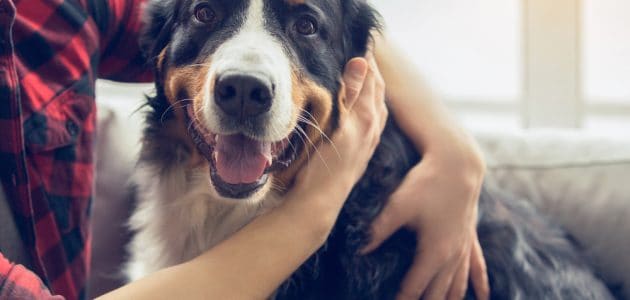
Ask any dog owner to talk about their four-legged companion, and the praise will be endless. The unconditional love and loyalty shown by dogs can brighten up anyone’s day, but can a dog help you deal with your anxiety? In a word, yes.
Anxiety is the most common mental illness among adults in the US, affecting around 40 million people every year. While there are several anxiety disorders, anxiety itself can also be a symptom of other mental illnesses such as depression, bipolar disorder, and obsessive-compulsive disorder (OCD).
Dealing with any mental illness can be difficult, but owning a dog helps greatly. Numerous scientific studies published over the last two decades have highlighted the positive effects of human-animal interaction on physical and mental well-being.
While the significant benefits of pet ownership are no secret, let’s take a closer look at how dogs help with anxiety and which breeds are best-suited for anxious owners.
How Do Dogs Help With Anxiety?
First things first, we need to understand how exactly dogs help with anxiety.
In simple terms, the most common symptoms of anxiety are restlessness, constant worry, fatigue, and self-doubt. Human-animal interactions cause positive hormonal changes that help combat these symptoms.
According to the Human-Animal Bond Research Institute (HABRI), positive human-animal interactions lead to decreased blood pressure, a lower heart rate, and reduced stress via the increased production of hormones such as cortisol, oxytocin, dopamine, and others.
Oxytocin, for example, is a neuropeptide known as “the cuddle hormone.” It regulates social bonding and stress relief. Interacting with dogs has shown to increase oxytocin levels in the brain. Increased oxytocin levels lead to a slower heart rate, a decrease in stress hormone production, and, consequently, reduce feelings of fear and anxiety.
Recent studies by the Journal of Psychiatric Research and Queen’s University have also noted the positive impact of pets on people with mental health disorders. Overall, there is enough evidence that bonding with a dog can boost your mental health by alleviating common symptoms of anxiety and depression.
Top 10 Best Dogs to Reduce Anxiety
1. Standard Poodle
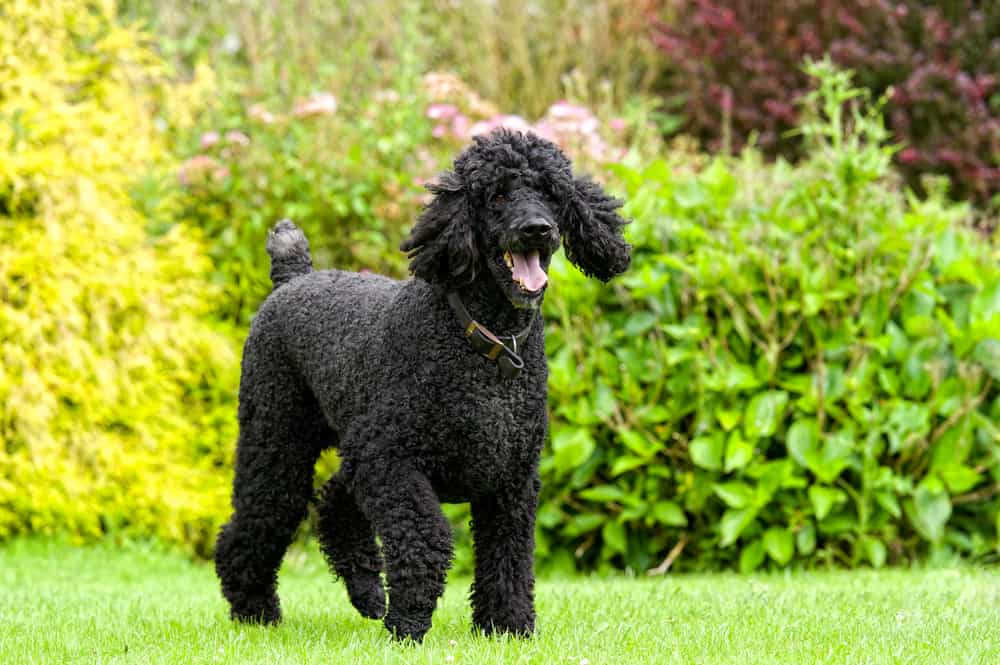
Poodles are mostly recognized as show dogs with the fancy “Continental Clip” fur design. But contrary to popular belief, poodles make for strong, remarkable companions. Poodles are eager, athletic, and caring.
If you want an intelligent dog that adapts to your needs and is always optimistic, then the poodle is the right choice for you. Poodles were originally used for duck hunting in Europe. They are easy to train, versatile, and work well with people.
Their intelligence, eagerness to please, and excellence in obedience training make them an ideal breed for psychiatric service. Moreover, poodles are a very low-shedding breed with hypoallergenic coats, meaning they are suitable for most people, even those allergic to animal fur.
The standard poodle’s enthusiasm is bound to lift your spirits during times of distress. Poodles are also naturally very affectionate and are known to be sensitive to their owner’s moods even when they haven’t been trained to do so. This trait is beneficial for those dealing with anxiety, depression, and other mental illnesses.
2. Labrador Retriever
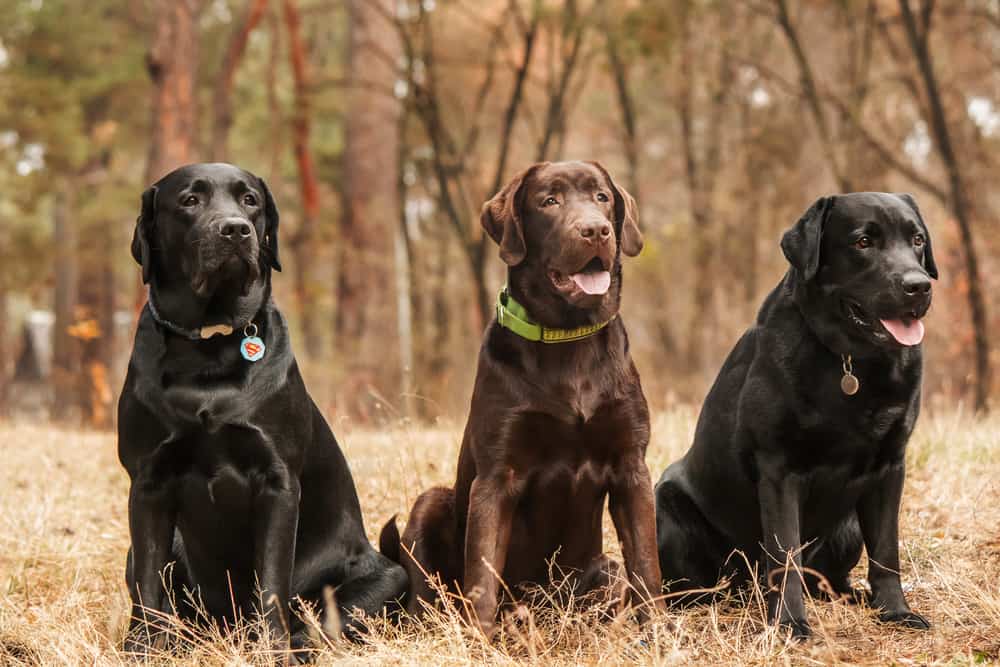
Labradors are among the most common pet dogs and are seen in many Hollywood blockbusters, most notably Marley and Me. They are also a popular choice for guide dogs. You’ve likely seen them helping blind or other disabled individuals. The reason Labradors are chosen for this role is that they understand and follow instructions quickly, and have a very calm and stable temperament.
These loyal pooches are extremely intelligent and help their owners feel more secure with their constant attention and affection. The ability to help owners feel safe in their surroundings is a valuable benefit for those suffering from anxiety.
Like poodles, they used to help hunters retrieve their kills and walk through rough terrain to deliver it to their owners. They have since been trained for multiple purposes. Their obedience and calm demeanor help their anxious owners feel safe in their surroundings. This is an invaluable benefit for people with anxiety, who often get overwhelmed in new environments.
Labradors are also used in other psychiatric services, such as helping children with autism or individuals with Attention Deficit Disorder (ADD). Labradors are also very playful and can distract owners when needed.
3. Golden Retriever
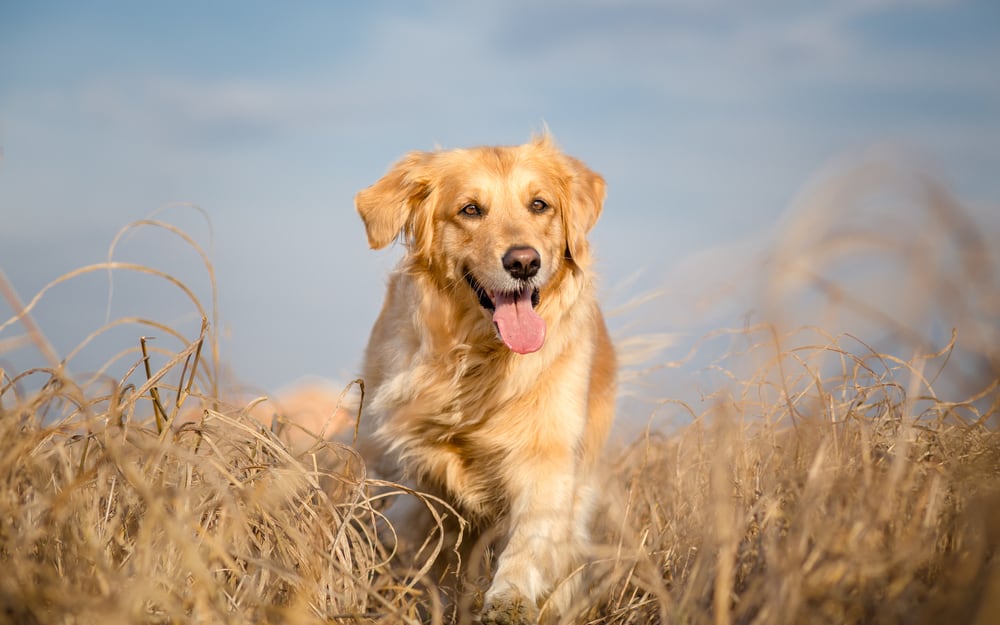
Another Hollywood favorite is the golden retriever. With their majestic coat and adorable playfulness, these dogs are dependable pals for their owners. Known for their distinct golden coat and calm temperament, golden retrievers can also easily socialize with other people and pets.
Golden retrievers, much like Labradors, are very popular pets and guide dogs. They were created to help hunters and are incredibly obedient animals. Their obedience makes them easy to train.
Retrievers are quick learners and can adapt to their owners’ needs with ease. They can be trained to do almost anything. Golden retrievers are also known for their loyalty.
Another notable trait is their seemingly never-ending energy. Golden retrievers will happily walk around or fetch all day. So if physical activity helps reduce your anxiety and you need someone to go out with, then a golden retriever is your best choice.
4. Pug
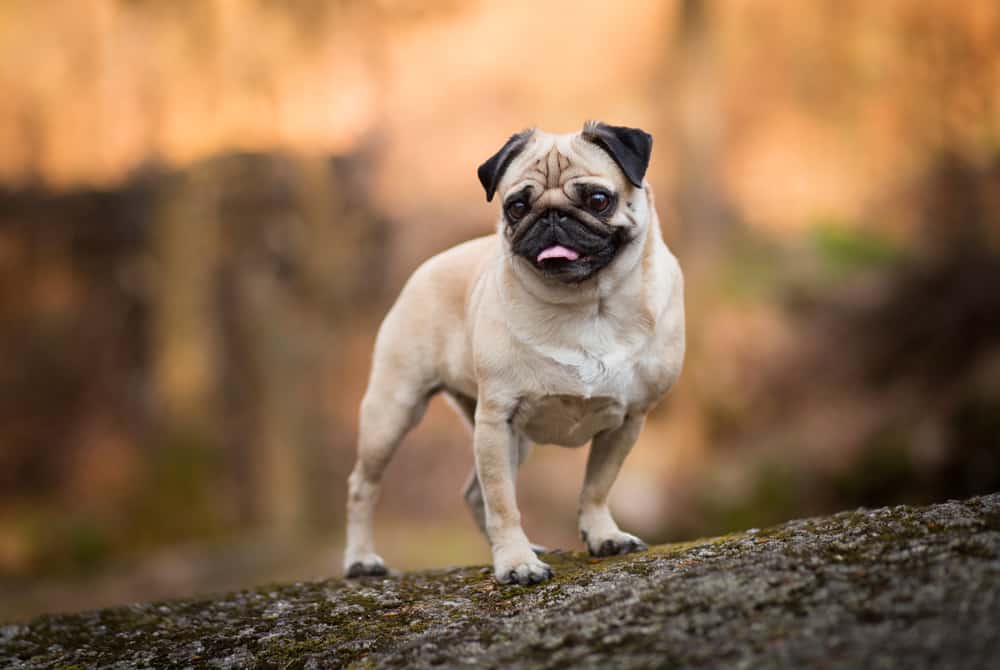
If small dogs with uncannily human-like expressions are your thing, then you should consider getting a pug. While this breed is not everyone’s cup of tea, they are loyal companions that are usually very positive.
When trained right, pugs are super energetic and a joy to be around, making them a popular option for those with any affliction. Many enthusiasts refer to pugs as the “clowns of the dog world” because their strange yet adorable grunts and sniffles make everyone around them chuckle.
Pugs don’t just help anxious owners by looking dorky and cute, they also have a joyous temperament and are always up for some affection. Socializing is another one of their strong points, and they are easy to bond with. If you’ve ever met one of these friendly little furballs, you know they are a treat to be around. Pugs are also good with children.
Overall, pugs are endearing and energetic dogs that can help people with anxiety by uplifting their moods and smothering them with cuddles. You can take pugs virtually anywhere, and they’re bound to get along with everyone in the room.
5. Yorkshire Terrier
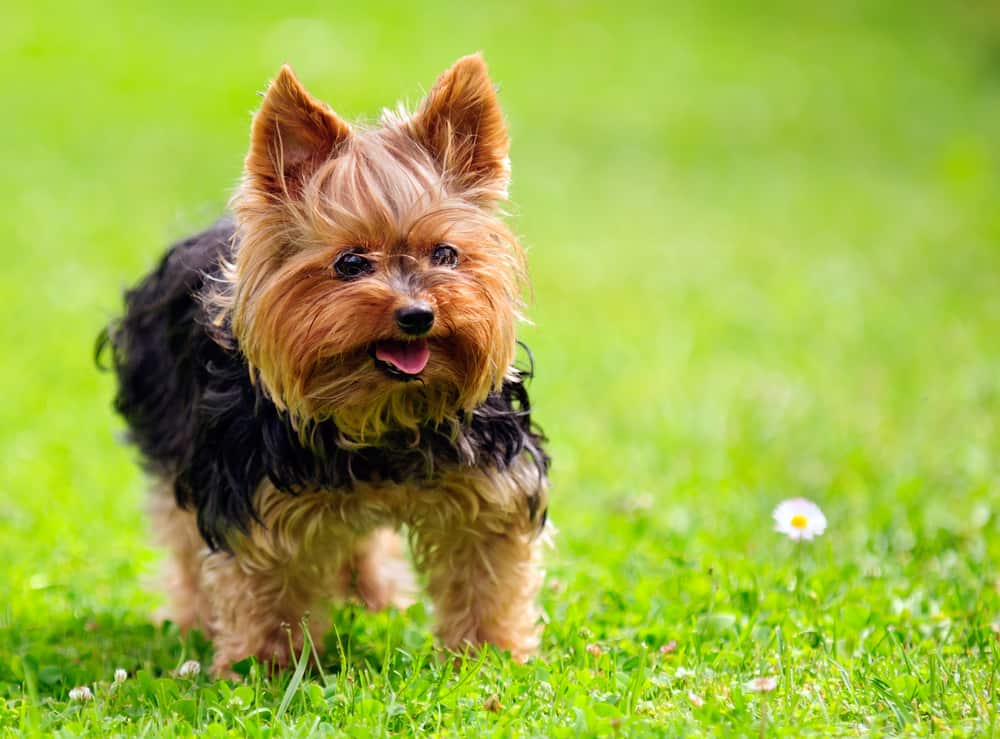
Another small bundle of joy to help people with anxiety is the Yorkshire terrier. “Yorkies,” as they are commonly called, are a top choice for therapy and service dogs. These little balls of energy improve people’s moods like no other.
They look adorable and are small enough to be taken virtually anywhere without any hassles. They form tight bonds with their owners and can be carried around via pouches or bags. Their portability makes them a popular choice for support dogs.
According to Animal Planet, a Yorkie named Smokey was the world’s first therapy dog. Smokey was used to raise the moods of injured soldiers during World War II. He was so good at helping the soldiers that Dr. Charles Mayo, of the renowned Mayo Clinic, began taking him on his daily rounds.
Despite their small size, Yorkies are brave, highly energetic, and socialize with others easily. They love being around their owner and are very affectionate. Yorkies are perfect for providing love and affection to their anxious owners.
6. Havanese
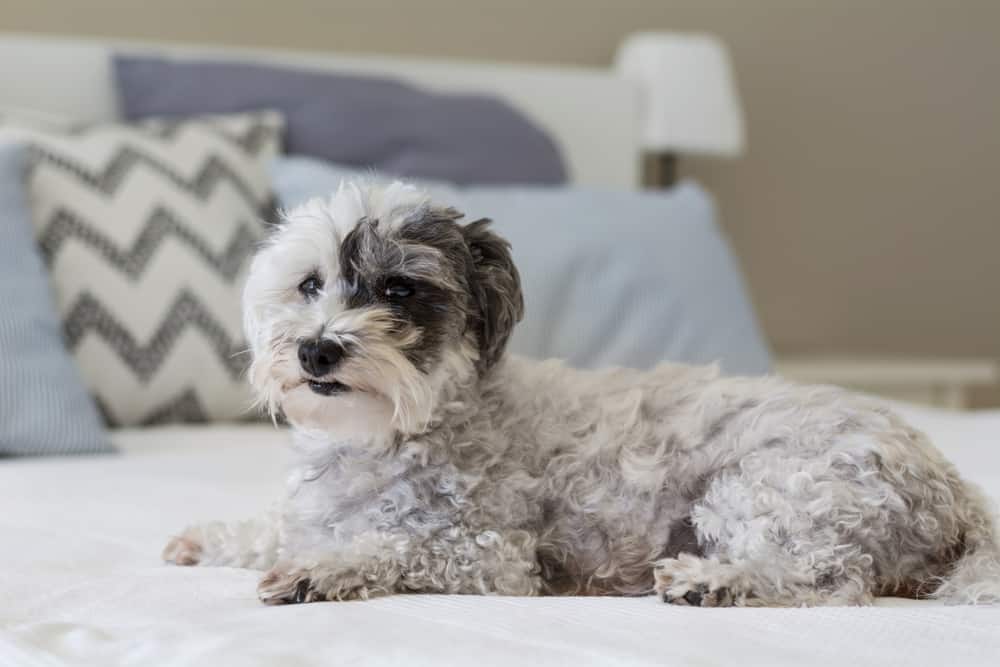
If you want a dog that stays by your side 24/7 and is always willing to give affection, you should consider a Havanese. These cute furballs are extremely affectionate and have a calm temperament.
This breed is known for its friendliness and extroverted nature, so they make great family dogs. They are also suitable for people who live with multiple roommates. Havanese excel in social situations, so you don’t have to worry about taking your pooch around the town.
People with anxiety are often plagued with restlessness and insecurity. A constant companion who loves to stick by you unconditionally is a great way to alleviate these feelings. Havanese are very cuddly and will smother you with love when you’re feeling down.
If trained right, Havanese dogs can become an invaluable friend for those with mental issues. They make excellent therapy dogs as they are very intuitive to their owners’ feelings. They are always ready to cuddle your worries away and keep you grounded.
7. Bichon Frise
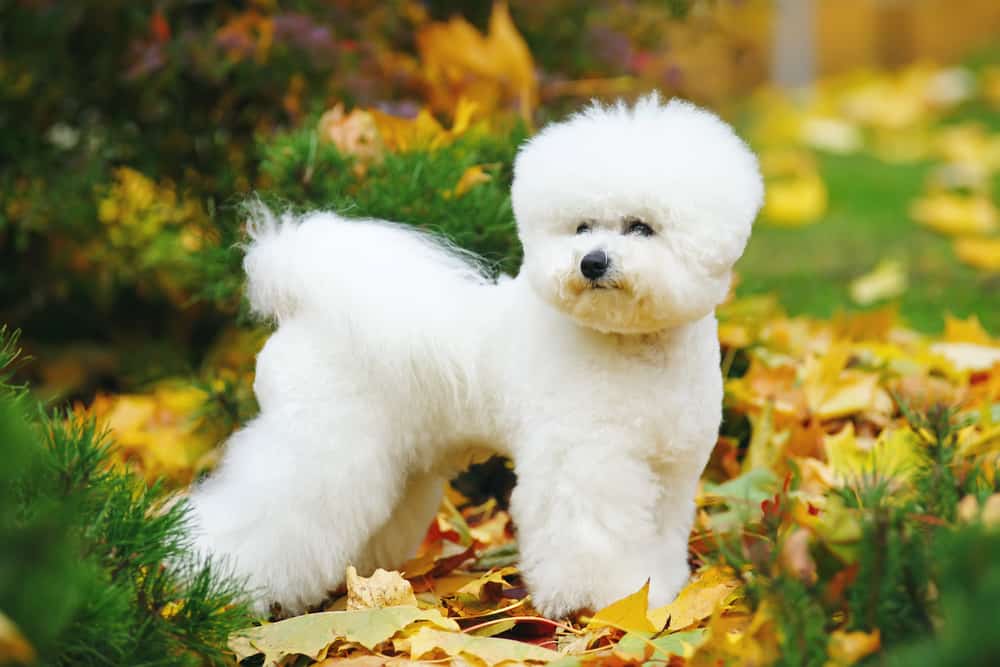
If you want a fluffball to brighten up your life, a bichon frise is just what you need. These dogs are very happy-go-lucky and always optimistic. This breed is particularly great for people that like socializing.
Bichon frises are known to be among the friendliest dogs. They get along with other dogs quickly and will also charm humans. While they are very social, bichon frises love being beside their owner and giving them all the love in the world.
Training a bichon frise is hassle-free, and they absolutely adore their owners. They have a joyous temperament and can adapt to your needs and routines efficiently. So whether you want a cuddle buddy to lay on the couch with or an energetic pup to play with, a bichon frise can do it all.
Bichon frises do not shed very much, so they’re ideal for allergic owners. The only downside is that this breed is very fluffy, so some elaborate grooming is necessary. Owners need to accommodate trips to the groomer regularly.
8. Welsh Corgi
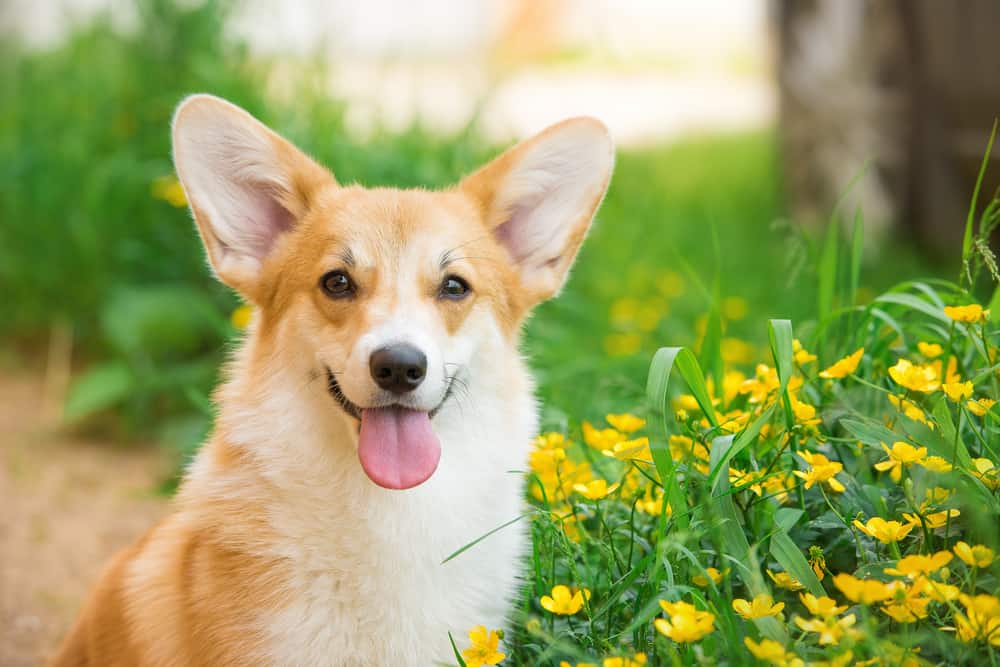
Welsh corgis are often overlooked as service dogs because of their smaller stature, but they are good guide dogs. Corgis are very intuitive about their owner’s mood, so they are also used as therapy dogs.
Welsh corgis were initially bred to herd cattle. They are brilliant, curious, and eager to please. They get along with other people easily, but they do take time to get used to other dogs.
Corgis are one of the most affectionate and devoted dogs an owner could ask for. They love spending time with their owners and are often deployed as companions in nursing homes and other care centers.
While they love relaxing, corgis are very energetic, so they’re likely to get you out of the house often. This may not be ideal for people who love staying indoors. However, if you enjoy walks and want a playful companion to alleviate symptoms of your anxiety, then corgis are great.
While corgis are smaller than retrievers, they are bigger than Yorkies, so they can’t be carried around everywhere. These medium-sized dogs might be too big to sit in your lap, but they’ll be content just sitting at your feet.
9. German Shepherd
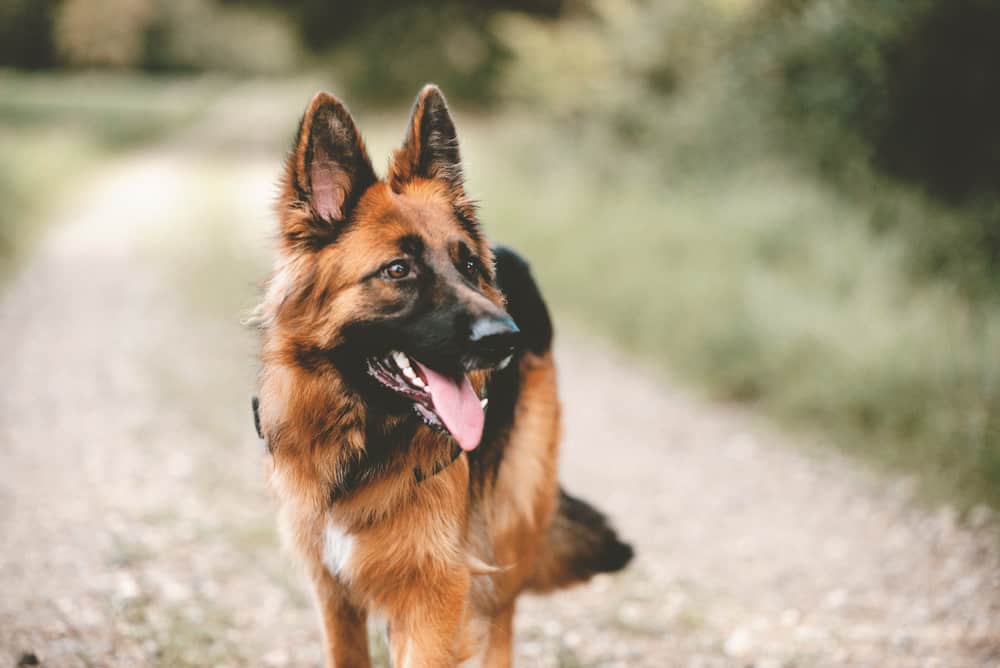
When you think of service dogs, a German shepherd is likely at the top of the list. German shepherds are very disciplined and loyal. They are incredibly calm, quickly learn what their owner needs, and adapts to them.
German shepherds are super smart and are utilized in many service areas. They serve as police dogs, guide dogs, and more. Some are even trained to help people with diabetes and post-traumatic stress disorder (PTSD).
For those dealing with anxiety, German shepherds can be trained to detect oncoming panic attacks and provide a distraction by pawing at you or offering cuddles. Their excellent protective instincts help them with this.
German shepherds are any dog owner’s dream. They are dependable, energetic, and friendly. They’re suitable for people who live alone or with others. Overall, a well-trained German shepherd is a great companion for owners with mental illness.
10. Border Collie
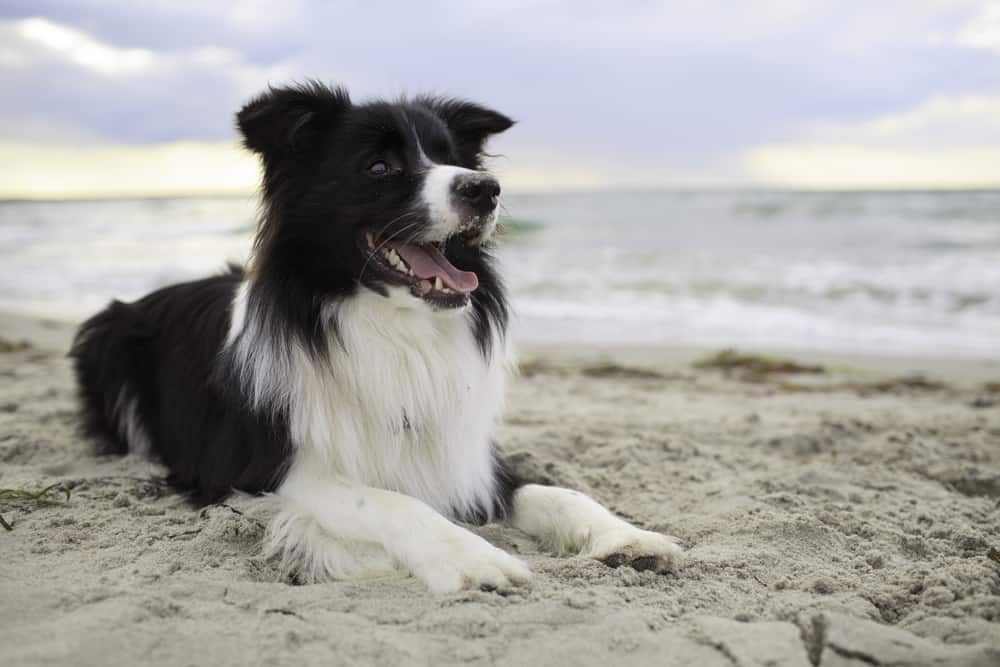
Border collies are arguably one of the most intelligent dog breeds. They are loyal, helpful pets who aim to please their owners. They are very affectionate to their human and love to play around.
Border collies were initially bred to herd cattle as their intelligence makes them easy to train. Their energy is very contagious, so they’re likely to get you out of bed and moving around. Their cuteness definitely helps their cause of cheering you up as well.
Like many service dogs, border collies are intuitive to their owners’ moods. They also love cuddles. When they sense that their owner is in distress, they tend to keep them calm or provide a distraction by showing physical affection.
Their seemingly never-ending energy might be a hassle to some people dealing with anxiety, but everyone’s needs are different, and some might love a border collie’s fun-loving nature.
Choosing the Best Dog to Help With Anxiety
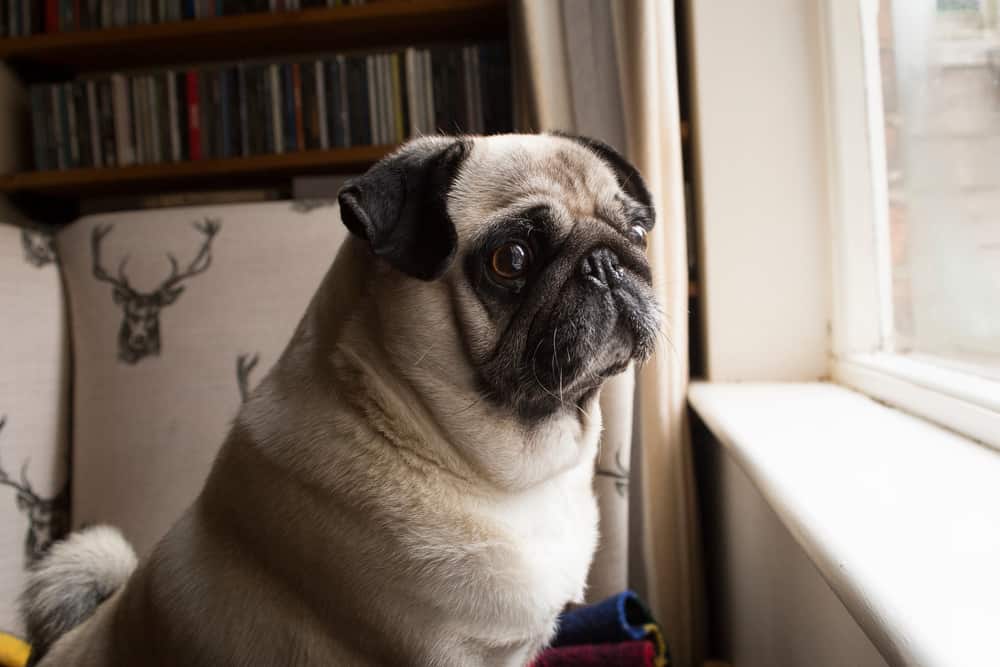
Now that you know the best breeds to help with anxiety, let’s dig a little deeper to help you narrow down your choices.
Should You Get a Service Dog, Therapy Dog, or Emotional Support Dog?
The first consideration is whether you should get a service, therapy, or emotional support dog. This choice depends on your day-to-day needs.
Psychiatric Service Dogs
Psychiatric service dogs are specially trained by specific organizations to help owners with mental illnesses. They can identify triggers and perform the necessary actions to aide their owner.
For example, if their owner has a panic attack, a psychiatric service dog can help them by:
- Bringing the necessary medicines or water.
- Bringing a phone, so their owner can call their therapist or avail other resources.
- Preventing emotional overload via physical actions such as licking your face or pawing.
- Calling others over to help an individual in crisis.
Not everyone is eligible to get a psychiatric service dog. This is because the dogs are meant to help people who have severe disabilities. Out of the 40 million people affected by anxiety every year, only a small fraction can get a service dog. Individuals whose conditions aren’t severe or debilitating are encouraged to get emotional support or therapy dogs.
You need a licensed medical professional’s recommendation to get a service dog.
Service dogs are legally protected by the Americans with Disabilities Act (ADA). This means organizations and businesses must make provisions to allow these dogs to accompany their owner everywhere. They can join their owners on flights, and landlords have to make the necessary adjustments for the dog to live with their owner.
Therapy Dogs
Therapy dogs are trained to comfort people via physical affection. They are used in nursing homes, hospitals, schools, and other care centers to help people deal with anxiety, loneliness, and stress. They also help war veterans and accident survivors deal with their trauma.
These dogs do not need to be certified but do go through training. Their training isn’t as extensive as service dogs. Because they provide support to a multitude of people, they are trained to be calm, gentle, and affectionate rather than performing specific tasks.
Therapy dogs are treated as pets and are not covered by the Americans with Disabilities Act (ADA). This means that you cannot take a therapy dog with you on flights, or any location where pets aren’t allowed.
Emotional Support Dogs
If you simply want a companion to be there for you when your anxiety flares up, you should get an emotional support dog. These dogs are there for comfort and help their owners by being their loving, adorable selves.
Emotional support dogs are considered pets and are protected to some extent by the Americans with Disabilities Act (ADA). For example, if you want to take your dog into a store, you can do so after getting permission from the owners.
You can also take your emotional support dog on flights or require your landlord to make specific changes to your accommodations by getting a letter from your therapist, doctor, or other suitable licensed medical professional.
Technically, any animal can be an emotional support animal. They do not need to be registered, but it is recommended to do so as it helps resolve tricky situations in public places. You can also buy your four-legged buddy a service dog vest to make things easier.
Depending on the severity of your anxiety, you can decide what kind of dog you want to get. Severe and debilitating anxiety calls for a psychiatric service dog, while mild and moderate anxiety calls for emotional support or therapy dogs.
Should You Get a Large or Small Dog?
Another major factor in deciding which four-legged companion you want to get is size. It plays a significant role in your daily life, and everyone has their preferences. Here are some points you should consider while making the decision:
Small Dogs
Small dogs are better for people that like to move around. For example, Yorkies can simply be put into a bag and taken with you anywhere you go. They can also fit right on your lap.
Small dogs are also better for those struggling with finances, as their care is often cheaper. Simple expenses like food, crates, and vet visits, are lesser for small dogs than for their larger counterparts. Also, for first-time owners, a small dog might be easier to handle.
Large Dogs
Larger dogs are often calmer and quieter, while smaller ones might get excited easily and bark often. If noise-levels are a significant concern, then you should get a larger breed. Also, big dogs are better suited to give you a nice, big snuggle when needed.
A major plus point for getting a big dog is that you can be assured of your safety in most environments. Anxious owners who feel overwhelmed by their surroundings easily or are constantly worried about personal safety should opt for a larger pooch.
Other Factors
Deciding what breed you want to get is a solid step in the right direction. Once done, you can look at other factors that affect both you and your dog. Please consider these factors before getting a dog:
Pet Ownership and Responsibilities
Whether you choose a big or small dog, you must be able to meet your dogs’ basic needs. These needs include regularly feeding them, taking them on daily walks, playing with them, and regular vet visits. There are also financial factors to consider.
It is understandable to skip a walk one day or postpone a vet’s appointment because you’re struggling with your anxiety. Do not be too hard on yourself. However, these needs must be met eventually and in a timely manner.
If these responsibilities seem too much for you, you can enlist the help of your loved ones. If this is not possible, then maybe pet ownership isn’t for you.
Taking Care of Your Own Mental Health
Dogs can significantly help your mental health, but at the end of the day, you are responsible for your well-being. Do not use your dog as an excuse to skip necessary therapy appointments and medications. Instead, use your dog as motivation to keep you on track.
While a support or service dog will provide you with endless love and help you whenever you need, they cannot account for deteriorating mental health conditions. In addition to getting a support dog, owners must make an active effort to identify the triggers, symptoms, and relief measures for their anxiety.
Do Not Abuse the System
While most people are sympathetic to disabled individuals and support animals, trying to take advantage of people’s kindness will land you in hot water. It can be detrimental to both you and your dog.
For example, many pet owners falsely claim their dog is an emotional support animal to get them on flights easily. This not only impacts the airline and other passengers, but it also hurts your dog.
Abusing people’s trust and empathy only makes the world a harder place for people who actually need their service dogs with them at all times. It creates unwanted suspicion and leads to disabled individuals having to get through more hoops.
Where to Get a Dog to Help With Anxiety?
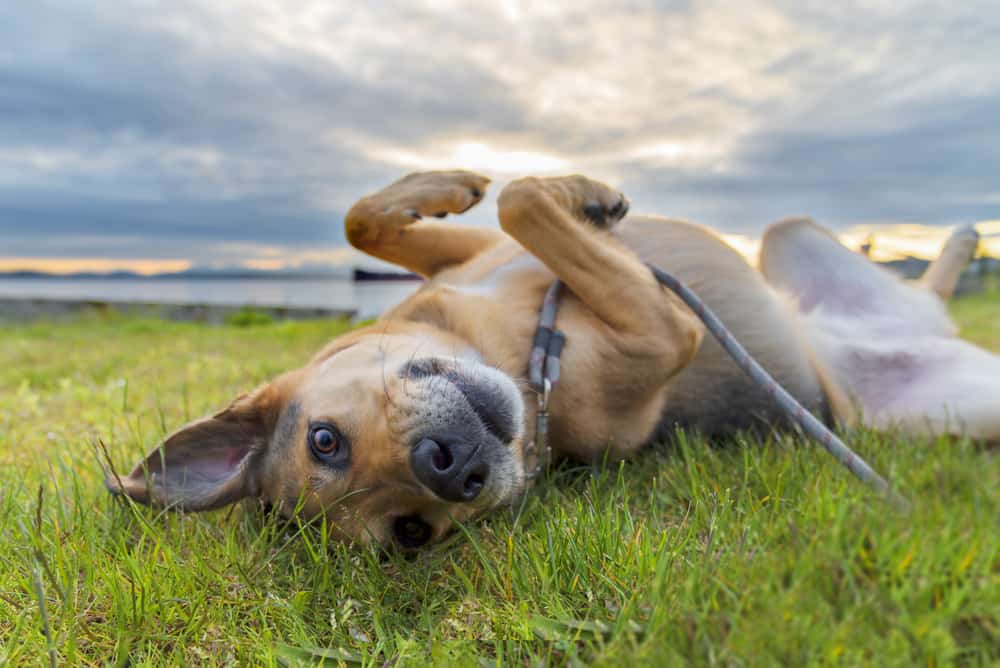
Once you’re ready to get a dog to help with your anxiety, you can head over to local organizations and meet your future four-legged friend.
If you’re simply looking for an emotional support dog to show you love and keep you grounded, you can visit local shelters. Many of the breeds mentioned above are likely to be there at local shelters, or you can find a breed-specific rescue.
You should consider adopting an older dog as they are often gentle and easier to handle than puppies, especially for first-time dog owners. Older dogs are likely to have already been home-trained and have plenty of love to give. Getting younger pups means you will have to invest time and effort in training them and getting them home-ready.
Emotional support dogs can also be bought through breeders. Contact local breeders via ads or social media, and they will help you get the right pet. Make sure your breeder has the appropriate registration. A significant benefit of getting a dog through a breeder is that they can provide detailed medical information and breed history about your potential pet.
If you want to get a psychiatric service dog, you need a letter from a licensed medical professional such as a therapist or a psychologist. Once you have the letter, you can contact organizations that provide service dogs. These organizations specialize in training service animals and can help you find the right one.
Pawsome Pal
Getting the right dog will greatly help in alleviating your anxiety, especially if you get one of the breeds mentioned above. Just train your pooch and treat them properly, and you’re guaranteed to have an unconditional support system by your side for years.




